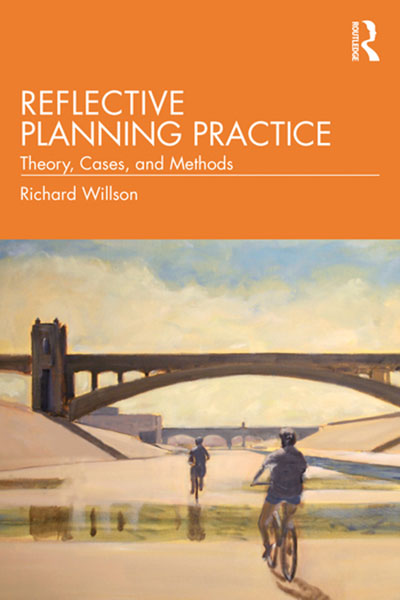Jan. 28, 2021
Richard Willson, FAICP, is a professor in the Department of Urban and Regional Planning at Cal Poly Pomona where he has also served as department chair, interim dean. His planning career spans over 40 years, first as a practitioner and then as a planning academic who maintains a consulting practice. The book reflects what he has learned through his practice in transportation planning, his research on planning theory and practice, and his experience teaching and mentoring planners.

The current book builds on his 2018 book, A Guide for the Idealist: Launching and Navigating Your Planning Career. That book argued that personal planning effectiveness involves navigating idealism and realism. Reflective Planning Practice explains how to accomplish that navigation, using reflection-on-action and reflection-in-action.
It offers a reflection framework and seven case study practice reflection examples drawn from a wide range of planning practices. The image on the book's cover resonates with its content: just like riding a bicycle, effective planning requires attention to the long view — the horizon. Moreover, it presents many choices of direction and requires in-the-moment reactions and practical
PLANNING: Planners are often thought of as competent, technical, skills-based professionals. "Reflective" isn't one of the usual adjectives. Why should that change?
WILLSON: Planners must have top-notch professional skills, of course, but skills alone are not sufficient to address the particulars of any planning episode. Almost always, they face choices about how to proceed, what knowledge to employ, and whose interests to serve. I refer to these choices as "practical judgments," or forks in the road where planners need to recognize that a decision is required and then decide. Planning on autopilot — following standard methods and procedures — just doesn't work in complex planning problems such as climate change adaption, homelessness, or structural racism. Reflection helps planners make wise decisions, either reflecting on past events or even better, reflecting while engaged in a planning process.
Reflection is a seldom-discussed element of effective planners' practices. Yet it's not new — Donald Schön and others have been writing about reflection in the professions since the 1970s. I'm seeking to revitalize the idea in a way appropriate to our times.
PLANNING: Your book calls for recognizing the role of planner-as-person. How does that affect how practicing planners currently do their job?
WILLSON: The planner-as-person idea means planning with a level of personal authenticity. This view disagrees with the notion that planners should set aside their personal values and act as neutral professionals, such as when decision makers specify ends (vision, goals, and objectives) and professionals evaluate and recommend means (courses of action) to accomplish those ends. Since most planners advise elected officials, boards, or clients who are directly accountable to the electorate, communities, or investors, we don't get to impose our personal views, but I argue that ignoring them is the wrong path.
Planners who set aside their own views and personal identities often feel uncomfortable, ineffective, or give up on the lofty aspirations of the planning profession including the aspirational values embodied in the AICP Code of Ethics. Personally, I cannot separate who I am as an evolving person from my practice. Of course, being an authentic planner does not mean that I simply declare my "truth" and expect others to follow. It requires that I engage in communicative practices with others, learn from them, push sometimes and compromise other times, and make complex ethical judgments about how to proceed. Reflection supports wise practical judgments.
PLANNING: In your APA Blog post "Reflective Planning: Navigating Idealism and Realism," you mention that today's planning challenges (racial justice, climate change, and pandemic response among them) require a reflective response. How does that look in day-to-day planning practice? Can you give an example using one of these pressing issues?
WILLSON: Action is imperative when the problem is dire. The realities of structural racism or climate change demand that planners respond, but a reflective approach doesn't interfere with action. I don't think of reflection as do-nothing contemplating and navel gazing, or narcissistic self-justification. Everything I have learned in my practice and from inspiring mentors convinces me that reflection leads to effective strategy.
In response to structural racism, for example, some advocate planners want to dismantle existing government institutions while others want to reform them. Who is right? I don't think that can be answered without a careful understanding of particulars of place, history, institutions, community power, politics, and possible unanticipated impacts. Sometimes compromise is right; sometimes it is a sell-out. I'm advocating for reflection-in-action so that the opportunities for making positive change are greatest.
The realities of structural racism or climate change demand that planners respond, but a reflective approach doesn't interfere with action.
PLANNING: Harold Henderson's review of your book in the Winter issue of Planning magazine includes this quote: "Planners do not give up, even when it is clear that their efforts are insufficient." How does reflecting on an effort that wasn't totally successful help planners with the next project?
WILLSON: I have been working to change policies that are biased toward private automobile transportation for most of my career. I know that my work is not enough, as that travel mode still dominates current transportation systems, with social and environmental harm. I also know that my work has an effect. While my work has not achieved all of my goals, it's not a waste of time. I don't give up. I take inspiration that I am working for the good and that I am not alone in striving for positive change.
When I look back at my practice, I have learned at least as much from examples that didn't work out as the easy wins. In my early practice, I was naive about the machinations of power, about how implementation commitment declines with time, and how interventions in dynamic systems can be unpredictable. As well, my early economics-based approach was blind to lived experience and the complex elements that motivate human behavior.
My planning flops have helped me improve my practice. For example, the book includes a case study in which a climate action plan didn't meet its targets. Reflection on that experience prompts me to build better implementation agreements into plans. In another case, reflection in the moment helped me realize that technical studies would not resolve a community conflict about parking, and I switched gears to an incremental "talking cure" approach.
PLANNING: You're a professor of urban and regional planning. How do you incorporate reflective planning in your teaching?
WILLSON: Cal Poly Pomona requires that students take professional practice courses as well as community-based application studios. Both initiate reflective practices. The professional practice courses allow me to prompt student planner-as-person reflection regarding career paths and use cases to foster debate about practical judgments made in the course of planning episodes.
Moreover, I think reflection lies at the core of all education. It is embedded in all my courses, including technical ones. For example, in addition to teaching standard transportation planning methods, I ask students to reflect about structural bias in those methods. What is included and what is left out? Who is recognized and who is not? Are there baked-in biases that are invisible to most participants? And how can lived experience and quantitative methods be integrated to develop effective plans?
Reflective Planning Practice: Theory, Cases, and Methods is published by Routledge, a proud publishing partner of APA. Routledge offers APA members 30% off all its print titles. Get the code.





